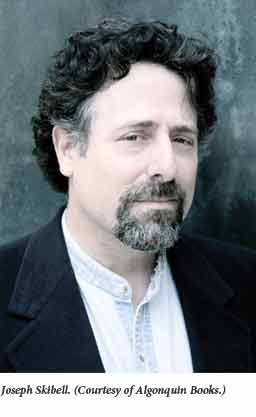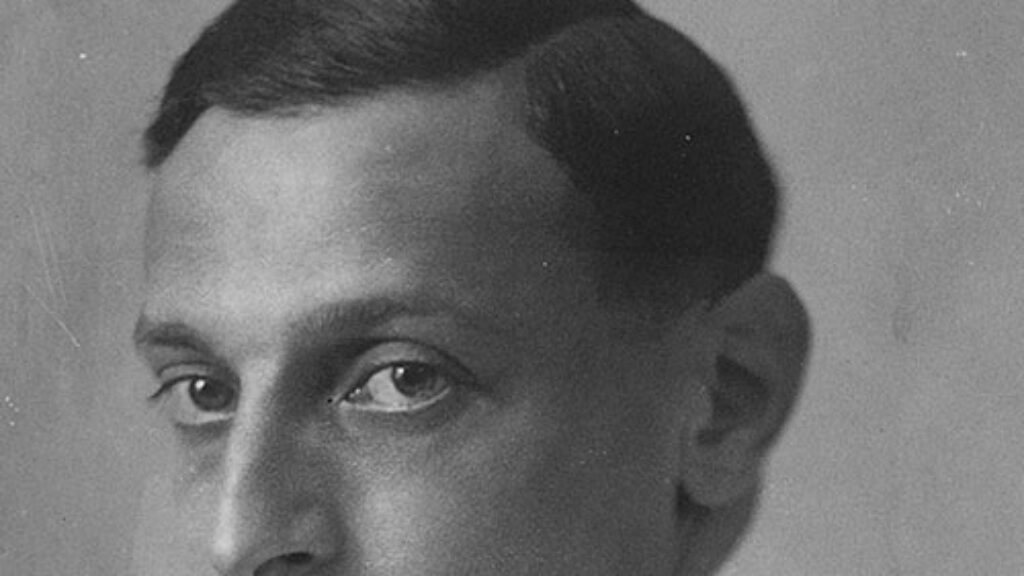Missed Connections
In fin de siècle Vienna, women took out ads in the local newspapers to send covert messages to prospective lovers, a precursor to Craigslist’s “Missed Connections” section. Sigmund Freud, who lived in the city at the time, was enchanted with the theories and personality of Wilhelm Fleiss, an ENT who believed that the nose was the root of unhappiness, and cocaine could cure all maladies. The founder of Esperanto, L. L. Zamenhof, had a daughter who converted to the Baha’i Faith in the 1930s. During the Holocaust, sneaking into the Warsaw Ghetto’s mikvah would lead to a sentence of ten years imprisonment.

Joseph Skibell’s A Curable Romantic contains all of these historical nuggets and dozens more. The novel is nothing if not ambitious, and it covers such enormous thematic, formal, and historical ground—think Ragtime plus One Hundred Years of Solitude with a dash of Dara Horn’s The World To Come—that it resists easy summary. It begins, via flashbacks, in the village in Galicia where the title character, Jakob Sammelsohn, was born and where he lived until age 13, when he ran away from his domineering, pious father. Jakob moves to Vienna, where he becomes an oculist, a good occupation for a descendent of the Hasidic master known as “the Seer of Lublin.”
In Vienna, Sammelsohn befriends Freud and falls in love with his first patient, Emma Eckstein. Later, he meets Zamenhof and becomes a convert to the cause of Esperanto, traveling to Paris for international Esperanto meetings and falling for another ardent Esperantist, the daughter of a wealthy businessman. During World War I, he briefly hides out on his father’s old property, then spends years in Warsaw, where, in 1940, he works as the amanuensis to the saintly Rabbi Kalonymos Kalmish Szapira and smuggles provisions over the ghetto wall.
What propels our hero from era to era? What drives the plot? Women—more specifically, the spirit of one woman, Ita, who is reborn (maybe) as a dybbuk, and follows him through the ages in a kind of reverse-quest narrative. According to Freud, the two first met during the time of Moses, and have been missing connecting ever since.
Ita and Jakob are briefly united when Jakob’s father forces him to marry Ita (in the form of an “idiot child”) for reading secular books. Jakob never consummates the marriage, instead sneaking out the window and going to Vienna. There, one night at the opera, he falls in love at first sight with Emma. Freud introduces the two, and Jakob, love-struck and gaffe-prone, comically pursues her. Emma acts the lady mostly, but now and again she is possessed by the lusty, vile spirit of Ita, who scolds Jakob for his treachery, tells him about his family since he left, and reminds him of their need to be together. During one long scene in a sanatorium, two angels join Freud and Jakob as the dybbuk inside Emma strains to exit her body. Throughout the rest of the novel, Ita appears (or does she?) in other human forms, and Jakob, never settled, always exiled, keeps searching for her.
This fantastic and fantastical plot is, surprisingly, as much sub-plot as main motor of the novel. As Jakob says, he is a minor character, content to be the wingman of the famous men and possessed women who possess him. His favorite activity is watching the puppet shows in the park, because “no one asks a puppet to reform his character or to improve it through psychoanalysis.”
In this historical novel, history often trumps the fiction of Jakob’s life, or at least history as imaginatively rendered by Skibell. Freud and Zamenhof talk a lot, and their words take up many of the pages. Sometimes their dialogue is didactic and stagy, but often it is as naturalistically rendered as that of the best historical fiction. The reader generally feels confident that Skibell has done his research, and that the otherworldly bits—dybbuks and long-lost loves—are the invented stories, the history verifiable.
Skibell, in other words, like any good historical novelist, is a dybbuk—animating the dead and making the past speak. Freud argues that a dybbuk is just the superstitious old world’s name for hysteria. “Yesteryear’s demonical possession corresponds entirely to the hysteria of our time,” he diagnoses. And the cause of the illness? “Hysterics suffer primarily from reminiscences,” the doctor tells us. If there is one thing from which his novel suffers, it is reminiscences.
Of his possession, his hysteria, Skibell is self-aware. As Jakob laments:
It is a peculiarity of us Jews that we tend to drag our history along behind us, clattering and clanking
like tin cans tied to the tail of a frightened dog, and the more we attempt to outrun it, the louder and
more frightening it becomes. Still, it’s nearly impossible for me to describe the shame of being haunted
by a dybbuk at the dawn of the 20th century, as though I were nothing but a benighted Ostjude!
After the novel’s first part, Sammelsohn leaves Freud, his first Doktorvater, and latches on to Zamenhof, a kindlier, more idealistic, forward-thinking visionary. Zamenhof, unlike Freud, believes that history can be overcome and psychic fragmentation made whole. He invented Esperanto because he saw how language separated Russians, Poles, and Jews in Warsaw:
No one can feel this unhappy separation as strongly as a Jew. And one day, when our people will have reacquired our ancient homeland, we will succeed in our historic mission, of which Moses and Jesus and Mohammed all dreamt . . . uniting mankind in a Jerusalem that will once again be the center of universal brotherhood and love.
Language is the dybbuk inside us all, possessing us, dividing peoples. It must be released, neutralized. Yiddish is unequal to the task, as Zamenhof points out: “Do you suppose we can achieve all that with
Yiddish . . . a jargon that doesn’t even possess a proper grammar?”
Jakob’s father too was possessed by language, and also distrusted Yiddish. He spoke only in Hebrew, quoting whichever scriptural passage best suited any occasion. In one hilarious scene, he tells his son the facts of life by threading together snippets from the Torah, in classical rabbinic fashion. Skibell does not translate all the Hebrew his father speaks, nor does he translate all of the Esperanto, or the nonsense words spoken by the angels and Ita. All told, the book is written in six languages, and in three scripts.
Esperanto, tellingly, has no word for “dybbuk” (“Dibuko? Transmigrado? Metempsikozo?”). The would-be universal language is the opposite of possession and Freudian psychopathology, which fragment and segment. It doesn’t even have a word for “war.” Skibell pairs and contrasts this universalist utopianism with Zionism, which Zamenhof rejected. Jakob asks his sister, headed for Palestine, how one is any less improbable than the other:
Sore Devore, let’s be honest now . . . As noble as your Drs. Herzl and Nordau might be, as splendid as is their goal, do you really imagine that the attainment of universal peace and brotherhood through an international auxiliary language is any less realistic than the restoration of the Jewish homeland in ancient Palestine?
The Esperanto movement fails, in a flurry of infighting and backroom deals, and it, as well as Zamenhof, come off as ridiculous as they do sincere. Why? Because Freud is right, and our histories must be spoken by composite, fractured people? Or, perhaps, it’s because of the Jewish condition. As Skibell has one critic put it:
Just as we possess a despised and ridiculed jargon that allows us to communicate with ourselves, as one family, across national borders, so, if Dr. Zamenhof has his way, will the entire world soon possess such a jargon. In this way, be believes he can smuggle our people into the great family of man while no one is paying attention. But, you see, there’s one problem . . . They don’t want us in their family.
Throughout A Curable Romantic, history keeps chafing against trans-historical desires, from the dybbuk, which Jakob continues to chase and be chased by, through his conversion to Esperanto, and into the Warsaw ghetto. There, he meets Rabbi Szapira, his third father figure (and, for some readers, perhaps the beginning of what should be a third, separate novel). The angels reappear, and together they ascend the steps to heaven. From the granular specificity of Viennese newspaper ads to the rendering of the Heavenly Bakery, Skibell’s scope really is breathtaking. This ambition sometimes swamps the novel’s plot and pacing, and reading it feels more pedagogical than enjoyable. But it is always thought-provoking.
What would happen if Jakob were reunited with his demon lover, Ita? It would be like everyone talking Esperanto, or getting up off the couch, cured. Our Zelig-like oculist would have to change his last name. Better not to tempt such fate; the perils of attaining one’s desire, of uniting, speaking a lingvo internacia, we are told, there in the ghetto, are too horrible to bear. Better to keep moving, one place to the next, one woman to the other, speaking that possessed tongue or the other, missing connections, a hysterical puppet trailing the clanging tin cans of history.
Suggested Reading

A Dashing Medievalist
Ernst Katorowicz had great courage and old-world personal charm—his Berkeley students were mesmerized by him.
Why There Is No Jewish Narnia
So why don’t Jews write more fantasy literature? And a different, deeper but related question: why are there no works of modern fantasy that are profoundly Jewish in the way that, say, The Lion, the Witch, and the Wardrobe is Christian?
Reorientation
A sober look at Jews and Christians under medieval Islamic rule.
With Words We Govern Men
In November 1975, US Ambassador to the UN Daniel Patrick Moynihan launched an empassioned battle against the "Zionism is Racism" resolution. A new book on the subject spurs memories of working with him at that historic moment.
Comments
You must log in to comment Log In